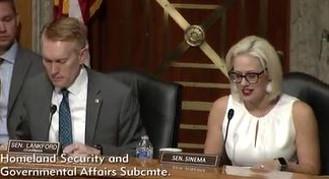STB's Rate Review and Market Dominance -- Reply Comment
In two related proceedings, the STB has proposed a streamlined approach to assessing whether a railroad has market dominance and a final offer process for small rate disputes.

Scholarly analysis of the potential effects of particular rulemakings from federal agencies, and advice to Congress on how to improve the rulemaking process by GW Regulatory Studies Center scholars.

"Your input and expertise during the drafting of the Early Participation in Regulations Act of 2019 and SMART Act of 2019 was invaluable."
Senator Kyrsten Sinema (D-AZ)
Senator James Lankford (R-OK)
Joint statement
STB's Rate Review and Market Dominance -- Reply Comment
In two related proceedings, the STB has proposed a streamlined approach to assessing whether a railroad has market dominance and a final offer process for small rate disputes.
STB's Market Dominance and Final Offer Rate Review
The Staggers Rail Act of 1980 deregulated most freight rail rates but left the Interstate Commerce Commission (and now the STB) with responsibility for ensuring that rail rates are “just and reasonable” for shippers who lack good transportation alternatives to a single railroad.
FDA's Proposed Rule on Mammography Standards
Early detection of breast cancer can save lives. Mammography is one of the screening tools that has contributed to reductions in breast cancer mortality. FDA has a unique role in mammography and should be commended for proposing to update its rules, particularly for those updates that reflect new technologies, such as the provisions related to digital mammography that update old regulatory terms like “x-ray film.”
From Beginning to End: An Examination of Agencies' Early Public Engagement and Retrospective Review
My testimony reviews the problems necessitating the practices required by your legislation and addresses and examines each bill’s requirements and impacts. It concludes with some crosscutting comments and observations.
DOE's Energy Conservation Program for Appliance Standards
In a notice of proposed rulemaking (NPRM), DOE is proposing to “update and modernize the Department’s current rulemaking methodology titled, ‘Procedures, Interpretations, and Policies for Consideration of New or Revised Energy Conservation Standards for Consumer Products’ (‘Process Rule’).”
In this rulemaking, the EPA and Army Corps are attempting to bring clarity to the muddy debate over the scope of federal regulatory jurisdiction under the CWA.
IRS's Qualified Business Income Deduction
Section 199A of the Tax Cuts and Jobs Act of 2017 reduced the maximum corporate income tax rate from 35 percent to 21 percent.
Wasted Energy: DOE’s Inaction on Efficiency Standards and Its Impact on Consumers and the Climate
Testimony in front of the House Energy and Commerce Committee.
NTIA's Approach to Consumer Privacy
NTIA is requesting public comments on its proposed approach to guide federal policymaking related to consumer privacy.
